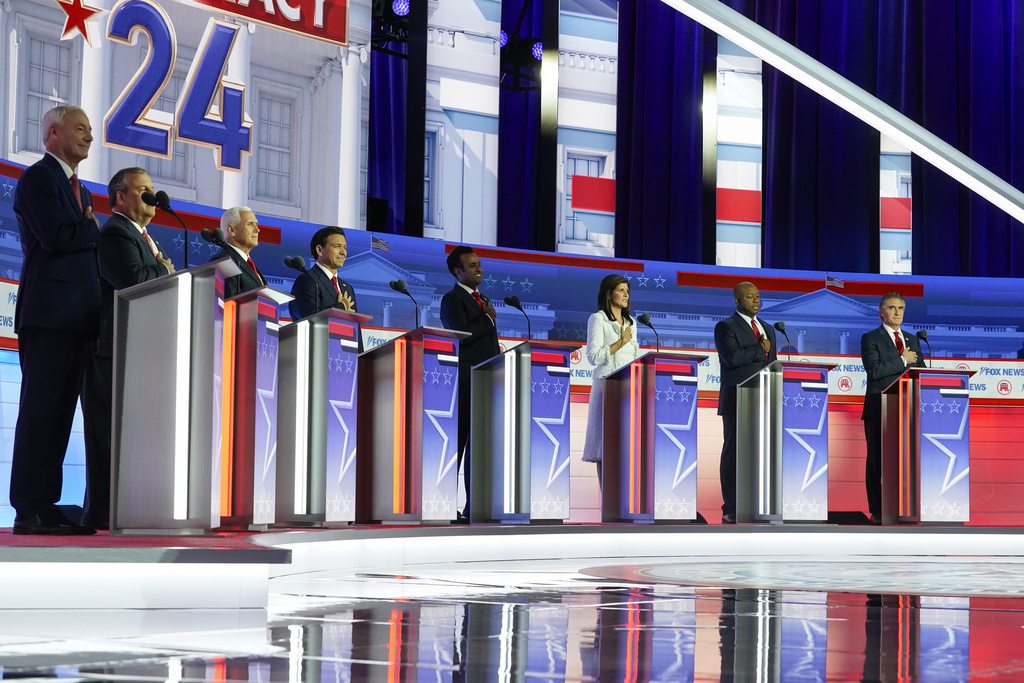A New York Times article title last week might have bested the stiff competition for Worst Headline of the Year if it weren’t so unoriginal. “Elections Are Bad for Democracy,” announced the bold print (since modified) above a think piece by guest writer Dr. Adam Grant, an organizational psychologist at the University of Pennsylvania’s Wharton School (the same Wharton School that predicted the Inflation Reduction Act would not reduce inflation).
In the piece, Grant proposes that we should “rethink and renew our approach to choosing officials.” That’s not a bad exercise, in the abstract; that’s what the U.S. Constitution of 1787 did, after all. Nor is Grant’s chief concern — a lack of integrity among holders of public office — invalid in the abstract.
But his solution is like trying to solve DeflateGate by burning down every football stadium. “If we want public office to have integrity,” he proposed, “we might be better off eliminating elections altogether.” Well, that seems… dramatic.
“People with dark triad traits [narcissism, Machiavellianism, and psychopathy] tend to be more politically ambitious — they’re attracted to authority for its own sake,” Grant explains. “Eliminate voting, and candidates with dark triad traits would be less likely than they are now to rise to the top.”
In other words, his theory is that eliminating elections will deliver public offices from people of ambition to people of integrity. This presumes two different sorts of people, some good and some bad. The Framers had a more realistic estimation of man’s nature.
“If men were angels, no government would be necessary. If angels were to govern men, neither external nor internal controls on government would be necessary,” wrote Alexander Hamilton in Federalist 51. “In framing a government which is to be administered by men over men, the great difficulty lies in this: you must first enable the government to control the governed; and in the next place oblige it to control itself.” How does Grant propose for this unelected government of officials of integrity to control itself? He didn’t think that far ahead, nor would his worldview be likely to raise the question.
Hamilton endorsed a “necessary partition of power,” as the Constitution outlined, “so contriving the interior structure of the government as that its several constituent parts may, by their mutual relations, be the means of keeping each other in their proper places.” This would make “the provision for defense” against ambitious men “commensurate to the danger of attack,” said Hamilton. In other words, “Ambition must be made to counteract ambition.” And that’s the genius of the U.S. Constitution — performing a judo move on a common human vice, capturing selfish ambition in service to the public good.
In lieu of elections, Grant proposes to select public officials via lottery from a rather broad pool. “In America, imagine that anyone who wants to enter the pool has to pass a civics test — the same standard as immigrants applying for citizenship,” he suggested. “We might wind up with leaders who understand the Constitution.”
We might, but the current Constitution requires elections. “The House of Representatives shall be composed of Members chosen every second Year by the People of the several States, and the Electors in each State shall have the Qualifications requisite for Electors of the most numerous Branch of the State Legislature” (Article I, Section 2). And “The United States shall guarantee to every State in this Union a Republican Form of Government” (Article IV, Section 4). Grant’s system would require nixing these clauses, the very foundation of the whole system, as well as elections for Senate and President, which were amended in later.
Again, from The Federalist: “The definition of the right of suffrage is very justly regarded as a fundamental article of republican government” (Federalist 52). “The elective mode of obtaining rulers is the characteristic policy of republican government” (Federalist 57). (The Founders’ understanding of “republican government” now fits within the broader modern usage of democracy, which applies to any system where governing officials are popularly elected.) Grant implicitly admits as much, writing, “The lifeblood of a democracy is the active participation of the people.” But how do the people actively participate if not through voting?
Grant suggests at least four additional benefits of the lottery selection system. First, he said, “When you know you’re picked at random, you don’t experience enough power to be corrupted by it.” Instead, based on the results of small group experiments, he suggested randomly selected officials would bear a greater burden of responsibility because they did nothing to deserve it. The results might bear that out where the stakes are low, and the groups are small. But that conclusion would follow for federal offices if mankind were incapable of ingratitude.
Indeed, Grant misses the whole point of why power corrupts — its intoxicating invincibility — and his proposed solution — making selections without regard to worthiness — would only increase the danger. That’s why the Constitution implemented checks and balances as “security against a gradual concentration of the several powers in the same department,” as The Federalist put it.
Nineteenth century political theorist Alexis de Tocqueville explored this issue in his “Democracy in America” — a title certainly relevant to this discussion. The problem with electing a head of state, he said, “is that it offers such a great lure to particular ambitions, and inflames them so much in the pursuit of power, that often, legal means no longer sufficing for them, they appeal to force when right happens to fail them.” So far, Grant might agree — with a reference to January 6 — and claim that Tocqueville would advocate his plan if he heard it.
But Tocqueville went on to clarify that the chief danger lies in the intensity of passions, which corresponds to the amount of power up for grabs. “The more prerogatives the executive power has, the greater the lure is,” he said. “The dangers of the elective system therefore grow in direct proportion to the influence exerted by the executive power on affairs of state.”
Then Tocqueville introduced his own observations: “No one has yet been encountered who cares to risk his honor and life to become president of the United States, because the president has only temporary, limited, and dependent power.” That was 1835, during the Jackson administration, when presidential patronage primarily encompassed customs houses and post offices. “The reason for this is simple,” Tocqueville explained, “having come to the head of the government, he can distribute to his friends neither much power nor much wealth nor much glory, and his influence in the state is too feeble for the factions to see their success or their ruin in his elevation to power.”
America’s situation is precisely the opposite today. Whether it is prestigious cabinet offices such as attorney general or secretary of Health and Human Services, or less prominent posts on the Federal Communications Commission or the Consumer Product Safety Commission, a president can appoint his friends and allies to numerous positions of immense — and seemingly ever-expanding — power, wealth, and glory. His influence is so great that factions see their success or ruin in his elevation to power. Every election becomes a crisis, an emergency, the deciding factor of our times. It is this gargantuan power that corrupts, not an officeholder’s self-perception of his own worthiness.
Next, Grant proposes that randomly selected officials might actually be more effective at their jobs. “People expect leaders chosen at random to be less effective,” he said, but he cited experiments in which “Groups actually made smarter decisions when leaders were chosen at random.” I’m not sure who he means by “people.” But, given the overwhelmingly dismal performance ratings most government officials receive, he may be surprised by how many ordinary Americans would agree that randomly selected citizens could do a better job.
The problem with his proposal is that someone — some group of persons with the same ambitions and interests as the rest — must carry out the “random” selection process. It raises questions like: Who designs and reviews the civics test? Who applies for the civics test? Who conducts the lottery selection? Who adjudicates exceptions or excusals? Who mediates disputes? Who ensures competent leadership when a crisis arises? Grant would likely give these jobs to public-minded, generous-hearted bureaucrats — who would effectively become the new ruling class. Essentially, he proposes a technocracy — a rule by experts.
But no such technocracy could long retain its pure, high-minded ideals. Ambitious, interested parties would seek to influence the “random” process in its favor — just as, if Congress were selected from the first 535 names in the phone book, many people would change their name to “Aaron,” or even “Aaaaa.” Even if the process were handed off to a computer algorithm, the design of the algorithm would become the most pressing political question of the day. The sheer amount of power at stake would require it. Yet note that every attempt to purify the process removes it further from real accountability to the people.
Grant also suggests that an election-free system would get rid of some of the messier, more controversial businesses of politics. “No voting also means no boundaries to gerrymander and no Electoral College to dispute,” he writes (there goes more of the Constitution). In other words, Grant’s plan jettisons all the local flavor of politics that makes every region, state, and even congressional district unique.
But this was a feature, not a bug, of America’s constitutional system. “The legislators of America did not believe that … it was enough to accord to the nation as a whole a representation of itself,” said Tocqueville. “They thought that, in addition, it was fitting to give political life to each portion of the territory. … This was wisely done.” This process “charg[es] citizens with the administration of small affairs” and thereby “interests them in the public good and makes them see the need they constantly have for one another in order to produce it.” The localism that experts anathematize is the very thing that enables citizens to engage most directly in government — what Grant concedes is the essence of democracy.
The final advantage Grant proposes is equality: “[T]here is nothing more democratic than offering each and every citizen an equal opportunity to lead.” But that’s not really true of his plan; there is still the civics test to pass. It’s easy to think of groups in which many members would not clear this low bar, either by inability or lack of application — the mentally disabled, homeless, young adults, single working mothers. The test may also be subtly biased against certain groups, such as religious conservatives, or viewpoints, such as monarchism. The “randomness” may be regulated with identity quotas. And pulling all the strings — I mean overseeing the whole process — are the technocrats, who aren’t truly equal with everyone else.
Nor does everyone deserve an “equal opportunity to lead.” Some people simply don’t possess the character or good judgment to be entrusted with that sort of responsibility, and those closest to them know it. Admittedly, unworthy individuals can and do rise to the top of our current system, but that is, again, because power is over-centralized. “One can capture the favor of a people all at once by a striking action,” said Tocqueville; “but to win the love and respect of the populace that surrounds you, you must have a long succession of little services rendered, obscure good offices, a constant habit of benevolence, and a well-established reputation of disinterestedness.”
According to Tocqueville, equality raises its own problems, which are accentuated when combined with despotism — always a danger wherever democracy exists. Despotism “sees the most certain guarantee of its own duration in the isolation of men,” he warned (a prevalent condition in modern America), while equality encourages individualism (another prevalent condition), which only increased the isolation.
“To combat the evils that equality can produce there is only one efficacious remedy: it is political freedom,” Tocqueville concluded. “From the moment when common affairs are treated in common, each man perceives that he is not as independent of those like him as he at first fancied, and that to obtain their support he must often lend them his cooperation. A free government not only allows the best men to rise above their fellows, but it also creates conditions whereby “through ambition one thinks of those like oneself, and that often one’s interest is in a way found in forgetting oneself.” Even if it is often acrimonious in individual instances, Tocqueville conceded, “the electoral system brings together in a permanent manner a multitude of citizens who would have always remained strangers to one another.” In other words, political freedom — voting — is the solution to equality’s flaws, not an obstacle to its attainment.
To give Grant credit, he did think about his innovative selection process — and even found a historical precedent. “If you think that sounds anti-democratic,” he said after describing his plan, “think again. The ancient Greeks invented democracy, and in Athens many government officials were selected through sortition — a random lottery from a pool of candidates.”
Ancient Greece isn’t the best role model. Its democracies were plagued by bloody coups and frequent civil wars, and mostly survived on the backs of ubiquitous slavery and imperialism. Not to mention the most basic problem with direct democracy: “[I]n all very numerous assemblies, of whatever character composed, passion never fails to wrest the sceptre from reason,” said Federalist 55. “Had every Athenian citizen been a Socrates, every Athenian assembly would still have been a mob.”
The New York Times did not publish Grant’s essay in a vacuum. The Left regularly attacks the Electoral College, state control of elections and districts, and the security of the elections themselves. In fact, the direct frontal assault on elections themselves — always in the name of democracy — did not originate here. The Guardian, a left-wing British paper, published a nearly identical title seven years ago, “Why Elections Are Bad for Democracy.” Grant’s article also notes that a group styling itself “Democracy in Practice” “works with schools [in Bolivia] to replace student council elections with lotteries” — which is anything but democracy in practice.
Meanwhile, a CBS News/NORC survey has recorded that a not-insignificant numbers of Americans believe that the use of force is justified to either restore Trump to the presidency (6.9%) or prevent Trump from being president (11.6%). That’s a sixth of the population. On live television, CBS News portrayed a graphic extrapolating that number out across the entire U.S. adult population to 18 million and 30 million Americans, respectively.
When did so many people turn their backs on peaceful, legitimate means to transfer power according to the will of the people? It started when Washington — particularly the executive branch — acquired too much power. And it accelerated as elites promoted the idea.
This article appeared originally here.
Notice: This column is printed with permission. Opinion pieces published by AFN.net are the sole responsibility of the article's author(s), or of the person(s) or organization(s) quoted therein, and do not necessarily represent those of the staff or management of, or advertisers who support the American Family News Network, AFN.net, our parent organization or its other affiliates.








